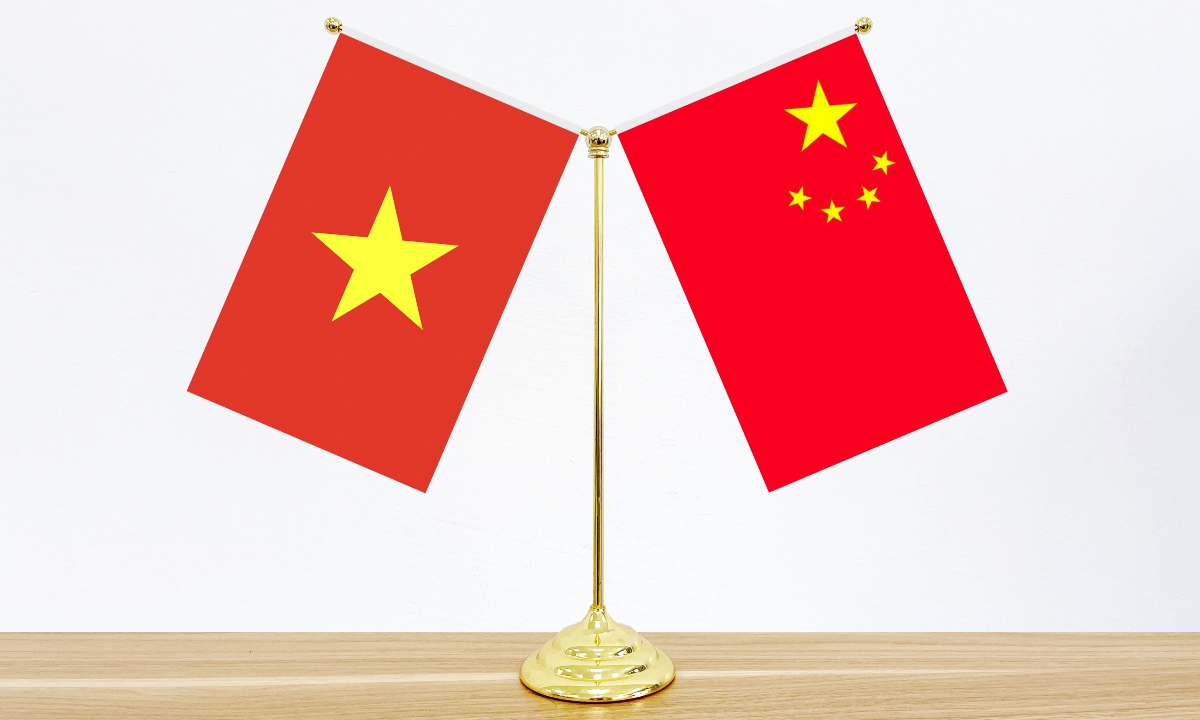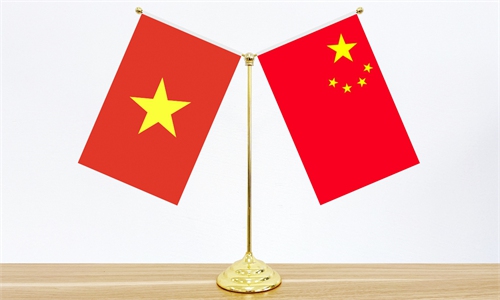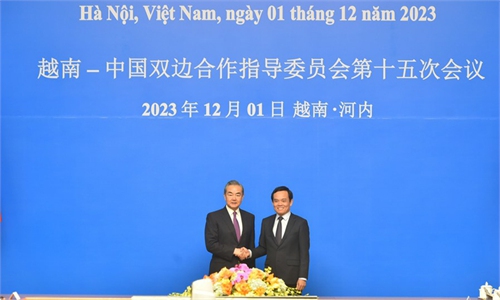Xi to pay state visit to Vietnam; two sides to discuss upgrading bilateral relations

China Vietnam Photo: VCG
Xi Jinping, general secretary of the Communist Party of China Central Committee and Chinese president, will pay a state visit to Vietnam from December 12 to 13, during which the two sides are expected to discuss upgrading China-Vietnam relations, focusing on six major areas including politics, security, practical cooperation, public support, multilateral affairs and maritime issues, according to the Chinese Foreign Ministry on Thursday.
Chinese analysts pointed out that the upcoming state visit reflects that both sides regard bilateral ties as important and unique, and distinct from relations with other countries. They stressed the importance of deepening cooperation between the two countries as both sides not only share the common task of safeguarding the security of the socialist system, but are also highly complementary in the fields of energy transition, trade and investment as well as enhancing connectivity and logistics capacity.
Foreign Ministry spokesperson Hua Chunying announced Xi's Vietnam trip, noting that it comes at the invitation of General Secretary of the Communist Party of Vietnam Central Committee Nguyen Phu Trong and State President of the Socialist Republic of Vietnam Vo Van Thuong.
Wang Wenbin, another spokesperson for the Foreign Ministry, later outlined the schedule and China's expectations for the visit at a regular press conference on Thursday.
Wang revealed that during this visit, Xi will hold talks respectively with General Secretary of the Communist Party of Vietnam Central Committee Nguyen Phu Trong and State President Vo Van Thuong and meet with Prime Minister Pham Minh Chinh of Vietnam and Chairman of the National Assembly Vuong Dinh Hue.
According to Wang, the two sides will discuss upgrading the China-Vietnam relations, focus on six major areas including politics, security, practical cooperation, public support, multilateral affairs and maritime issues, and work to deepen and substantiate the comprehensive strategic cooperation between the two countries. This will help both countries to jointly follow their modernization paths with respective features, enrich the paths to modernization for developing countries and bring more benefits to the two peoples.
The spokesperson noted that this year has seen frequent high-level interactions, close exchanges between various departments and regions, and deeper cooperation in various fields, which have brought tangible benefits to the peoples of the two countries.
The world is in a new period of disorder and transformation, with increasing instabilities and uncertainties. China and Vietnam are both socialist countries and both are advancing reform and transformation that fits their respective national realities. Greater solidarity, closer friendship and deeper mutually-beneficial cooperation are in the common interests of both sides and conducive to peace, stability and prosperity of the region and the wider world, Wang said.
Chinese analysts also expressed their high expectations of the upcoming visit.
Xu Liping, director of the Center for Southeast Asian Studies at the Chinese Academy of Social Sciences, told the Global Times on Thursday that one area of focus in China-Vietnam economic and trade cooperation is green energy. Xu is currently on a research visit to Vietnam
Vietnam has a high demand for solar energy and needs to promote the rapid development of the photovoltaic industry, Xu said.
According to Reuters, during this summer Vietnam was battling electricity cuts caused by a heatwave. Reuters noted that a lack of rain has hit output of hydropower, the No.2 source of electricity, with some northern provinces receiving just a fifth of last year's figure, weather data shows. Also, media reported that Vietnam announced its target of achieving net zero by 2050 during the COP26 World Leaders' Summit in 2021.
In this context, Xu remarked that Vietnam faces significant pressure to transition to new energy sources but lacks the necessary technological expertise. On the other hand, China has been rapidly developing in the field of new energy. This creates strong complementarities between the two countries.
Enhancing connectivity between the two countries is expected to be another focus of the visit. Given that the two sides are discussing the construction of a high-speed railway along the border, improving logistics capacity and exploring the potential of the existing China-Vietnam international railway could be another area of cooperation.
Zhao Weihua, director of the Center for China's Relations with Neighboring Countries at Fudan University, told the Global Times on Thursday that his team visited Vietnam last month to carry out research and investigation, and had exchanges with scholars from the Vietnam Academy of Social Sciences and other research institutions, as well as Chinese enterprises in Vietnam.
Zhao said although labor costs in Vietnam are still relatively low, the country hopes to gradually eliminate labor-intensive, low-tech, and highly polluting traditional industries such as textiles.
Before the pandemic, Vietnam had proposed to embrace the "Fourth Industrial Revolution," although this process has been delayed due to the pandemic's impact. Now Vietnam still hopes that Chinese companies investing in the country will be high-tech industries and large-scale enterprises, which can bring advanced management experience.
Zhao mentioned that the focus of bilateral economic and trade cooperation includes jointly building the Belt and Road Initiative, infrastructure, e-commerce, and agricultural products.
Given that Vietnam considers China a top priority in its foreign policy and China sees Vietnam as a priority in its neighboring diplomacy, the diplomatic positioning of both countries towards each other holds significant importance, Xu said.
According to media reports, Vietnam has elevated its bilateral relations with the US and Japan this year to comprehensive strategic partnerships. It is worth noting that this year marks the 15th anniversary of the establishment of the comprehensive strategic cooperative partnership between China and Vietnam.
Xu pointed out that the China-Vietnam relationship has a longer history and includes the element of "cooperation." It reflects the importance and uniqueness of bilateral ties, which distinguishes it from relations with other countries.
Analysts added that the economic and trade cooperation between China and Vietnam is currently facing interference from the US' Indo-Pacific strategy, but it is unrealistic for Vietnam to follow the "de-risking" of Europe and the US against China, as it will be difficult for Vietnam to find alternatives to the products imported from China.
Xu believes that China and Vietnam should jointly find ways to increase the added value of products so that Europe and the US cannot arbitrarily lower prices. "This is a challenge that the two sides should jointly address," he said.
"The two sides need to jointly elevate the potential of China-Vietnam economic and trade cooperation and promote the in-depth cooperation in the supply chain and industrial chain, which can effectively resist geopolitical oppression," Xu said.



